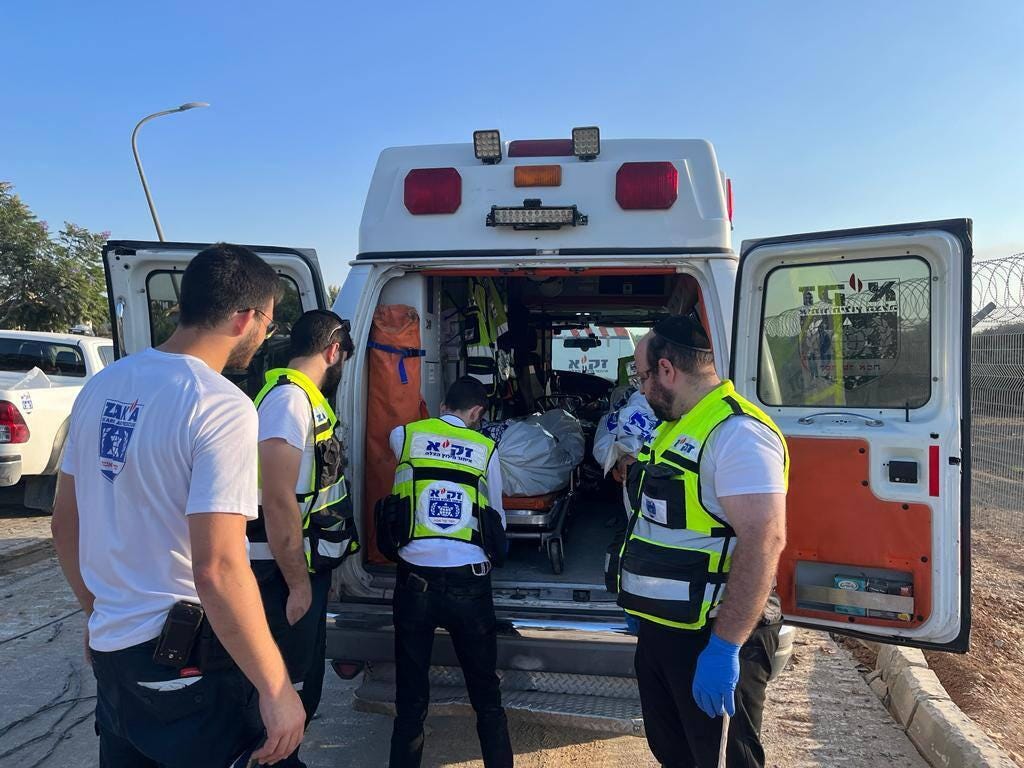Exposure, Connection and Involvement
A significant, albeit small, change in the chareidi community
There’s a very interesting interview at Vos Iz Neias with a journalist from Bnei Brak, Yanki Farber. He says that there is a significant change in the charedi community as a result of this war, in contrast to previous wars. Farber says that this time, there are a number of charedim (apparently between 1500 and 3000), who want to be involved in a practical way, enlist in the IDF in a non-combat capacity, and get basic weapons training.
While the number of such people is unfortunately very small compared to the size of the charedi population, the phenomenon is significant, and will hopefully help legitimize and start a larger change. But what I want to focus on here are the two reasons that Farber gives for this development.
One reason he gives is that unlike with previous wars, many charedim are actually personally scared. They recognize that they are vulnerable to rockets and to infiltrations. There are many charedim who live in towns near Gaza, in Kiryat Sefer, or near to potentially dangerous towns like Lod. Even those in “safe” towns are worried about Arab workers and recall tragedies like those of Har Nof and Neve Yaakov.
The second reason that he gives is particularly interesting. He says that Covid caused many charedim to get connected to the Internet. As a result of this, instead of just getting their news from sanitized newspapers like Yated and HaModia, they are seeing the terrible photos and videos and stories and news in real time. This, too, makes them feel more connected and makes them understand that they are involved in this.
To put it concisely: exposure and connection helps create involvement. (This also relates to my earlier post, What Charedim Need to Understand about Religious Zionists, regarding the importance of understanding the mesirat nefesh and resultant anxiety and sensitivity of communities which send their men to the IDF. The more you really understand the sacrifices being made, the more you respect them.)
This is not to say that more exposure is always important. There are many people in Israel who need less exposure and more distraction, for the sake of their mental health and their ability to continue life in this country. Here at the BMNH, we are subsidizing visits for refugee families from the South, and it’s absolutely clear that we are fulfilling a crucial function in helping their mental health. One mother subsequently told us that her son was asked, in his Zoom class, what makes him happy, and he said “petting the animals at the museum.” (If you’d like to help make it possible for more families to come, please be in touch!) On the other hand, I would think that for those people that are not really affected by the war and who could be doing more to help, then it should be more like Tisha B’Av, where it is wrong to do things that will remove you from the spirit of the moment.
In general, whether a person ought to feel more connected or detach a little relates to several factors. This includes where they live (both country and community), the situation with their loved ones, and the degree to which they are already supporting the war effort, as well as their psychological make-up.
But certainly overall, people need to very significantly connect to what’s going on. And the availability of exposure, of really understanding the realities of what’s going on, is crucial. The first step to recognizing one’s role in a situation is to really grasp what the situation is. We can’t afford to have people living in a bubble.




The penultimate issue of Headlines podcast featured 4 charedi rabonim/speakers. I wouldn't recommend the 1st, but the latter 2, r lopiansky and r glatstein, were both great.
They both stressed that one can and should have a double edged approach:
1. We are super grateful to the IDF for putting their lives in literal danger. It's a very necessary השתדלות that we have to do.
2. We recognise that אין עוד מלבדו and ultimately the נצחון of this war is in His hands only.
I think that's the approach everyone should have. The only question is how much emphasis do you put on one over the other.
(Nathan, You are right) traditionally many charedim only had the second approach.
Conversely, many chilonim only have the first approach.
A true synthesis of the 2 approaches is what we are witnessing now. We have lots of videos of secular soldiers singing מי שמאמין, עם ישראל חי etc and putting on ציצית and תפילין, which is amazing and heartwarming. We also have lots of charedim acknowledging the sacrifice of the soldiers. Charedi shuls are saying the מי שברך לחיילים in shuls. It's amazing.
I did once see a photo of an Israeli war room. Bunch of officers standing around a map planning a tactic. with a poster behind the officers stating ה' ילחם לכם ואתם תחרישון. That was perfect!
Nb
As a critical person, I need to end with one criticism(!), which is that the leadership of Israel's govt and army still don't seem to ever publicly thank Hashem or acknowledge him. On twitter it's always about them. They seem to only hold of the first approach. Is it all still כוחי ועוצם ידי?
(The Arabs often say alahu Akbar. We need to counteract that).
It would be amazing if someone with clout could encourage Israel's leadership to start publicly mentioning the impact of God on this war.
Excellent. You have outdone yourself!
Thank you,
Irwin (Yitzchak) Rubin